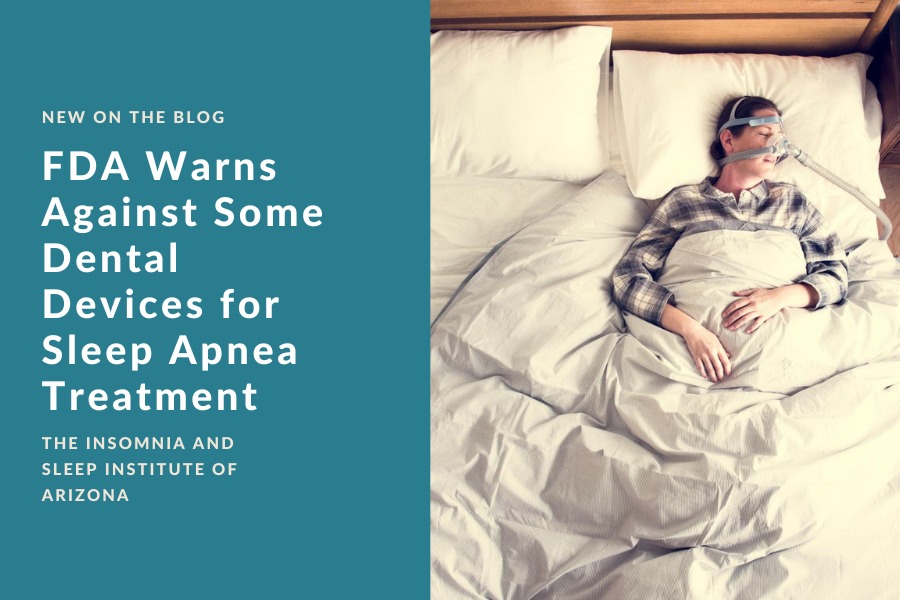The gold standard in obstructive sleep apnea (OSA) treatment is CPAP therapy. This treatment is available at The Insomnia and Sleep Institute of Arizona and is a pre-requisite before becoming eligible for alternative therapies like the Inspire implant. Even though CPAP has been the frontline therapy for managing OSA for years, there are a few other “treatments” that are on the market. This includes dental devices that are fixed palatal expanders. These expanders remodel the jaw and are non-removable. They are also not available in our clinic because we exclusively work with therapies that are shown to be the best, most effective, and safest.
Recently, the US Food and Drug Administration (FDA) issued a statement that it is looking into safety concerns with some of these expanders. According to the FDA, the devices they are warning against were not originally designed or intended to help with OSA—as such, they are not cleared or approved by the FDA. The statement also stresses that there have been reports of “serious complications” when using dental devices. The FDA encourages health care providers and patients to report any issues related to these devices immediately.
What the FDA Says for Healthcare Providers
It will take the FDA time to sift through all of the existing information and seek out additional details. For now, they are asking healthcare providers to be aware that they are looking into safety concerns. “Be aware the safety and effectiveness of these devices to treat conditions such as obstructive sleep apnea…have not been established,” the issuance warns. The FDA also stresses that using these devices to treat OSA “may result in serious complications which may require intervention, such as chronic pain, tooth discoloration, flared teeth, uneven bite, difficulty eating, damaged gums, exposed roots, bone erosion, and tooth loss.”
These palatal expanders work by widening the palate (roof of the mouth). It’s a common treatment to make room for crowded teeth. Palatal expanders are most often used in orthodontic treatment, particularly for children and teens whose upper jawbones aren’t fused together yet. The FDA has no concerns about using these expanders in the orthodontic treatment of children. However, an adult’s upper jawbones are already fused—and that’s where problems can occur.
A fixed palatal expander is forceful, and a fused palate doesn’t want to expand. If the force is applied incorrectly, painful complications can emerge. These complications will often need to be intervened by a dental professional. Currently, the FDA is working towards locating and contacting those who might be impacted by these concerns. Any violations are being sought out and the FDA is committed to taking appropriate action.
Best OSA Treatment
Obstructive sleep apnea is the most common type of sleep apnea. It is present when the airway is temporarily blocked while you are sleeping. The most commons sign of sleep apnea is snoring but, understandably, many people might not be aware that they snore. Excessive daytime fatigue and catching yourself waking up gasping or choking are also telltale signs. Along with CPAP therapy, other positive strategies for sleep apnea include sleep hygiene best practices and, if applicable, weight loss.
Those who are obese, and particularly those who carry excess weight in their neck, are especially prone to OSA. It is crucial to get OSA managed as soon as possible, whether through weight loss, lifestyle changes, CPAP treatment, or a combination of all three. OSA is linked to a number of co-morbidities, including an increased risk of heart disease, stroke, diabetes, and early death. The sooner you start managing your OSA, the healthier you will be.
CPAP technology has come a long way in recent years. There are a variety of different machines and accessories to choose from. Since CPAP adherence requires a minimum of four hours of usage per night, getting the right machine and fit is essential. We will help you throughout this process to make sure you get the most benefits out of CPAP therapy. Should CPAP not ultimately work for you, we are also one of the few clinics that offers the Inspire implant. To learn more about sleep apnea management, contact The Insomnia and Sleep Institute today by calling the office or filling out the online contact form.





